WTF Solidity 33. Sending Airdrops
Recently, I have been revisiting Solidity, consolidating the finer details, and writing "WTF Solidity" tutorials for newbies.
Twitter: @0xAA_Science | @WTFAcademy_
Community: Discord|Wechat|Website wtf.academy
Codes and tutorials are open source on GitHub: github.com/AmazingAng/WTFSolidity
In the world of cryptocurrency, one of the most exciting things is receiving an airdrop of free tokens. In this tutorial, we will learn how to use a smart contract to send ERC20 tokens as an airdrop.
Airdrop
An airdrop is a marketing strategy used in the cryptocurrency industry where a project distributes tokens for free to a specific group of users. To qualify for an airdrop, users are usually required to complete simple tasks such as testing a product, sharing news, or referring friends. The project gains seed users through the airdrop, while users receive a sum of wealth, making it a win-win situation.
Since there are usually a large number of users receiving an airdrop, it is not practical for the project to send each transfer one by one. By using a smart contract to batch-send ERC20 tokens, the efficiency of the airdrop can be significantly increased.
Airdrop Token Contract
The logic of the airdrop contract is simple: by using a loop, a single transaction sends ERC20 tokens to multiple addresses. The contract contains 2 functions:
The
getSum()function: returns the sum of auintarray.// sum function for arrays
function getSum(uint256[] calldata _arr) public pure returns(uint sum)
{
for(uint i = 0; i < _arr.length; i++)
sum = sum + _arr[i];
}Function
multiTransferToken(): sends airdrop ofERC20tokens, including3parameters:_token: Address of the token contract (addresstype)_addresses: Array of user addresses receiving the airdrop (address[]type)_amounts: Array of airdrop amounts that correspond to the quantity of each address in_addresses(uint[]type)This function contains
2checks: The firstrequirechecks if the length of_addressesarray is equal to the length of_amountsarray . The secondrequirechecks if the authorization limit of the airdrop contract is greater than the total amount of tokens to be airdropped.
/// @notice Transfer ERC20 tokens to multiple addresses, authorization is required before use
///
/// @param _token The address of ERC20 token for transfer
/// @param _addresses The array of airdrop addresses
/// @param _amounts The array of amount of tokens (airdrop amount for each address)
function multiTransferToken(
address _token,
address[] calldata _addresses,
uint256[] calldata _amounts
) external {
// Check: The length of _addresses array should be equal to the length of _amounts array
require(_addresses.length == _amounts.length, "Lengths of Addresses and Amounts NOT EQUAL");
IERC20 token = IERC20(_token); // Declare IERC contract variable
uint _amountSum = getSum(_amounts); // Calculate the total amount of airdropped tokens
// Check: The authorized amount of tokens should be greater than or equal to the total amount of airdropped tokens
require(token.allowance(msg.sender, address(this)) >= _amountSum, "Need Approve ERC20 token");
// for loop, use transferFrom function to send airdrops
for (uint8 i; i < _addresses.length; i++) {
token.transferFrom(msg.sender, _addresses[i], _amounts[i]);
}
}
multiTransferETH()function: SendETHairdrop, with2parameters:_addresses: An array of user addresses that receive the airdrop (address[]type)_amounts: An array of airdrop amounts, corresponding to the quantity for each address in_addresses(uint[]type)
/// Transfer ETH to multiple addresses
function multiTransferETH(
address payable[] calldata _addresses,
uint256[] calldata _amounts
) public payable {
// Check: _addresses and _amounts arrays should have the same length
require(_addresses.length == _amounts.length, "Lengths of Addresses and Amounts NOT EQUAL");
// Calculate total amount of ETH to be airdropped
uint _amountSum = getSum(_amounts);
// Check: transferred ETH should equal total amount
require(msg.value == _amountSum, "Transfer amount error");
// Use a for loop to transfer ETH using transfer function
for (uint256 i = 0; i < _addresses.length; i++) {
_addresses[i].transfer(_amounts[i]);
}
}
Airdrop Practice
- Deploy the
ERC20token contract and mint 10,000 units of the token for yourself.
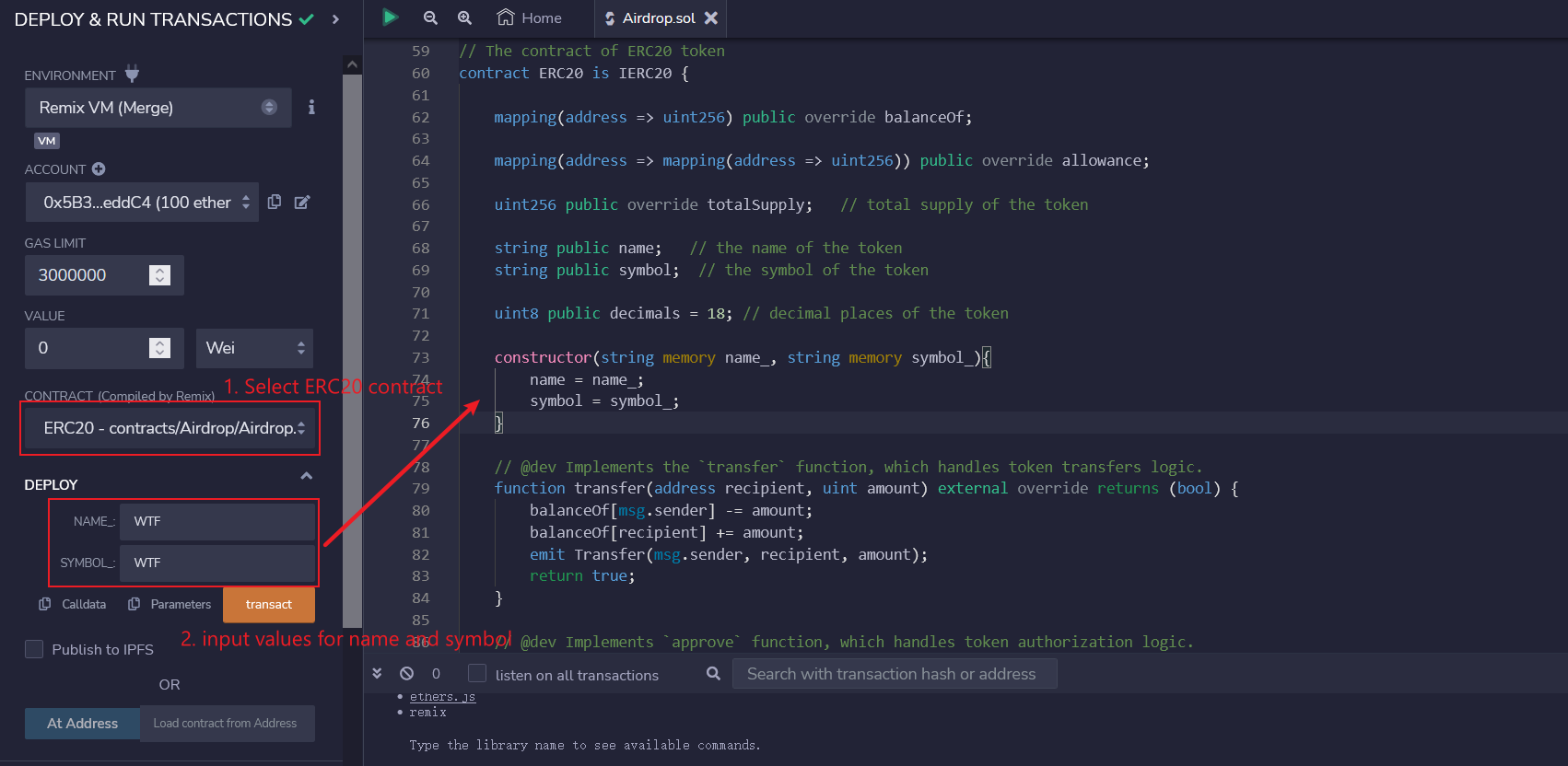
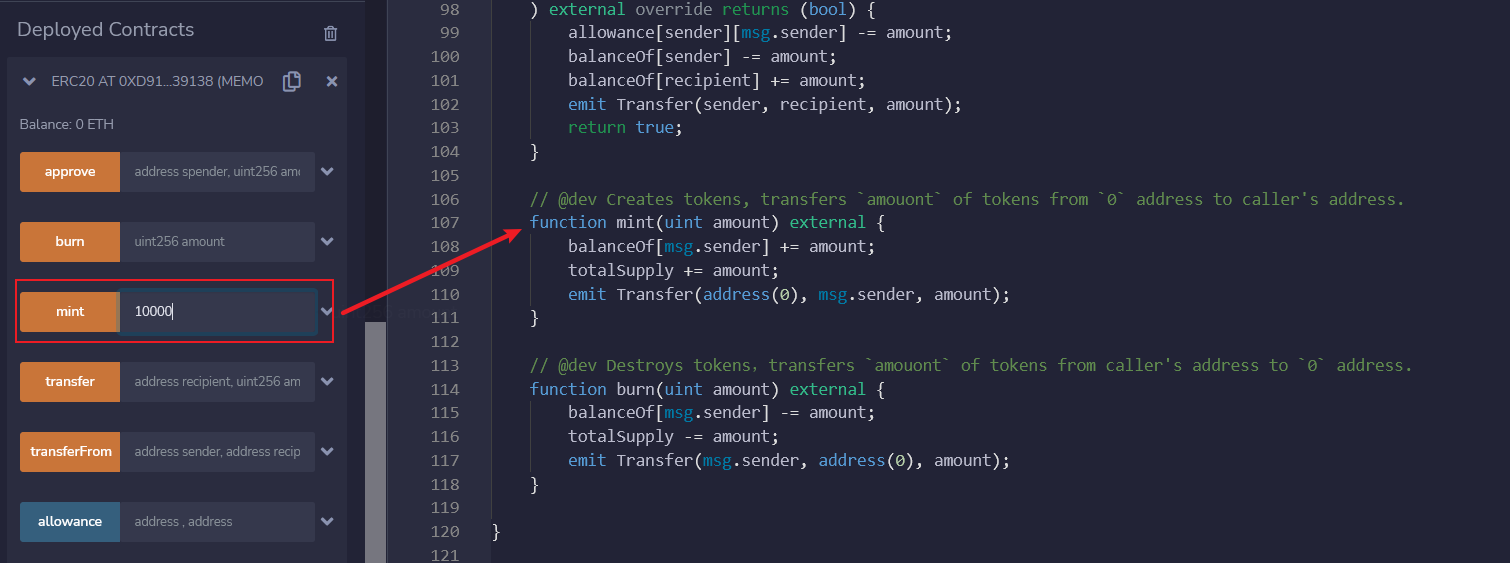
- Deploy the
Airdropcontract.
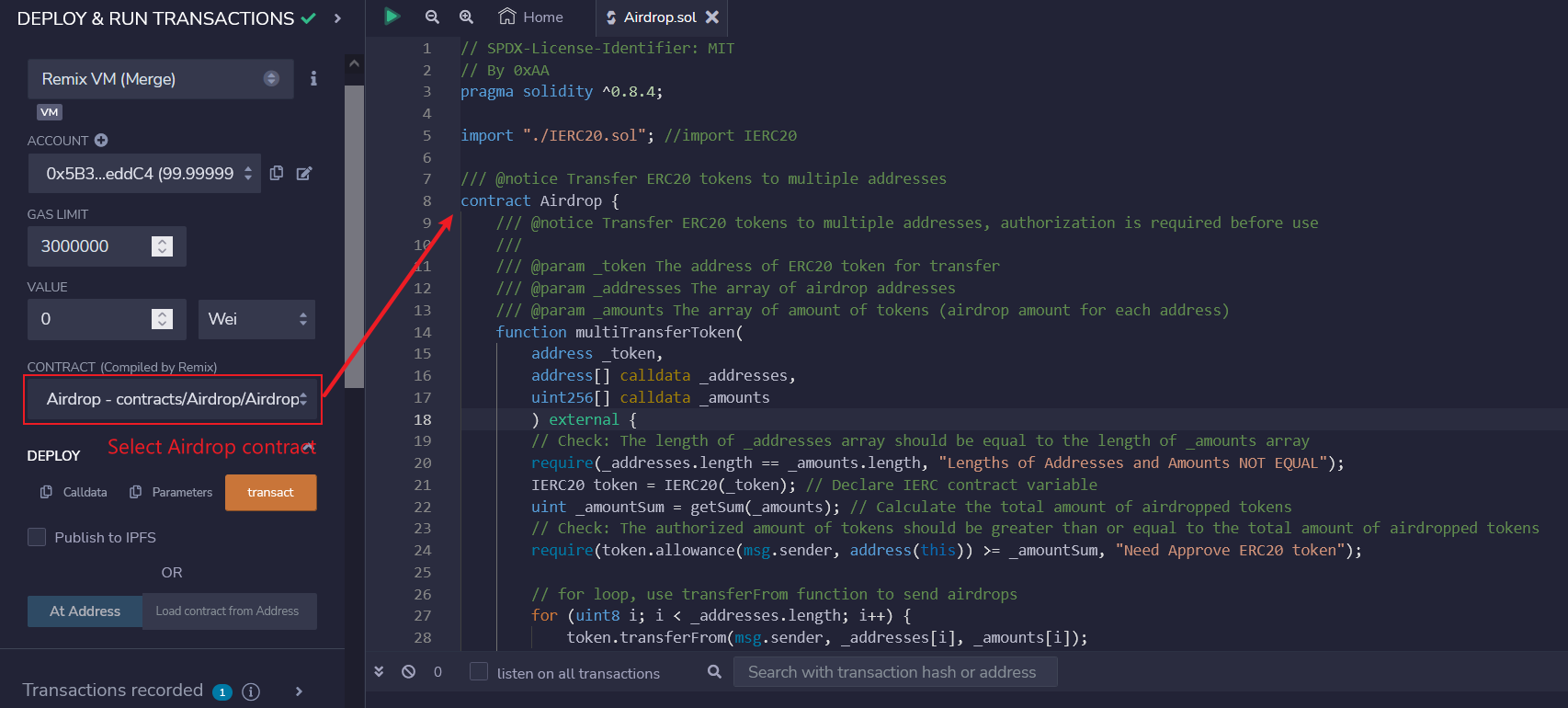
- Use the
approve()function in theERC20contract to grant authorization of 10,000 units of the token to theAirdropcontract.
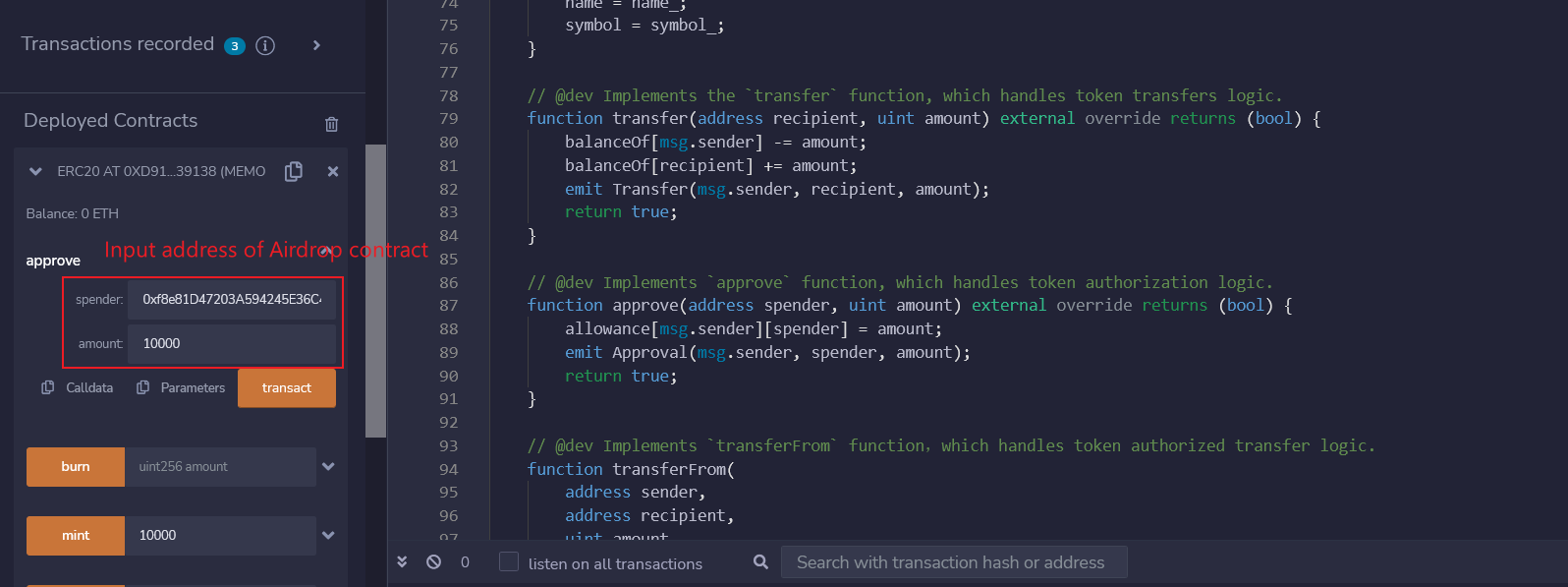
- Execute the
multiTransferToken()function in theAirdropcontract to perform the airdrop. Set_tokenas theERC20token address, and fill in_addressesand_amountsas follows:
// input _addresses like below
["0xAb8483F64d9C6d1EcF9b849Ae677dD3315835cb2", "0x5B38Da6a701c568545dCfcB03FcB875f56beddC4"]
// input _amounts like below
[100, 200]
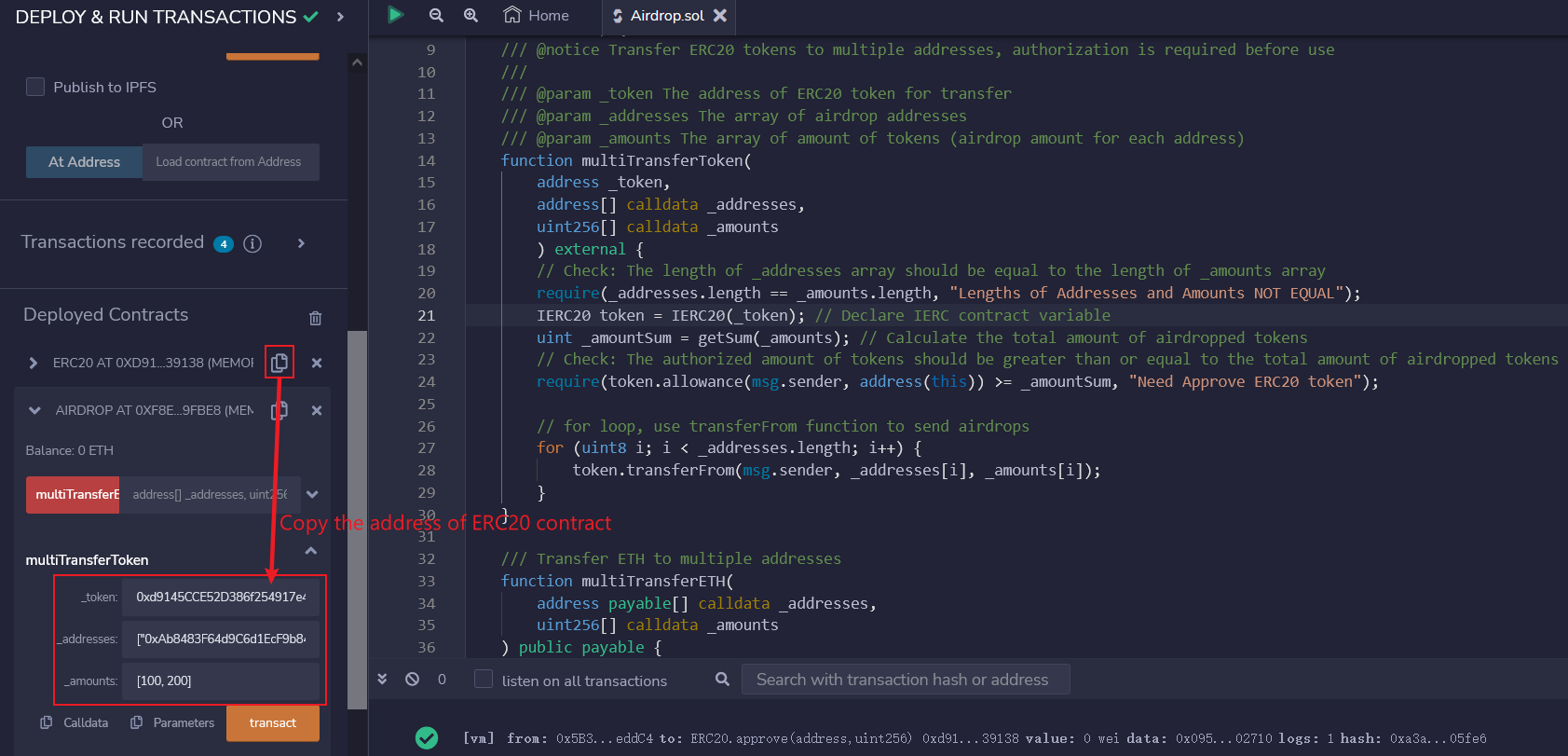
- Use the
balanceOf()function of theERC20contract to check the token balance of the user address above. The airdrop is successful if the balance becomes100and200respectively!
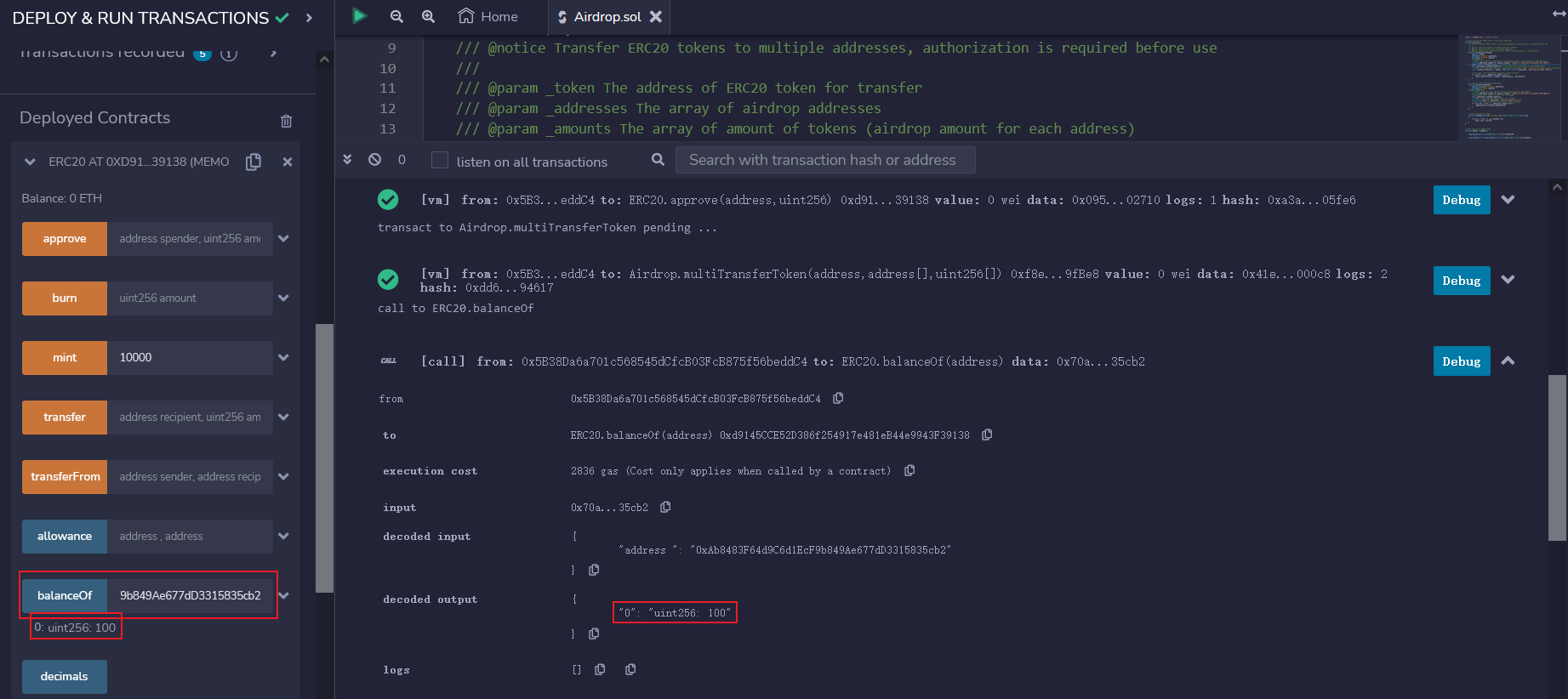
Conclusion
In this lesson, we introduced how to use solidity to write an ERC20 token airdrop contract, greatly increasing the efficiency of airdrops. The biggest airdrop I ever received was from ENS, how about you?